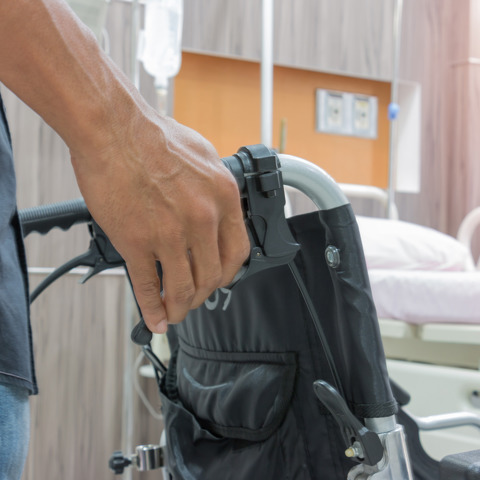
Report highlights importance of standardised care to reduce risk of limb amputation for people with diabetes-related complications
NHS report looks at compensation claims from people who have had diabetes-related lower-limb amputations.
Standardised care and better education could prevent patients with diabetes from undergoing amputations due to complications, according to a recently published NHS report.
The NHS Resolution report added that these measures could preserve wellbeing and save the NHS money.
The NHS Resolution report looked at themes in compensation claims involving patients with progressive diabetes-related lower-limb complications.
The report considered 92 claims and of these, 55 patients underwent a major lower limb amputation.
The report said that in the majority of cases a good standard of care is provided to patients with diabetes by the NHS in England. However, the report also highlighted that more could be done to reduce patient harm with appropriate, timely care.
The report identified themes in compensation claims involving patients with progressive diabetes-related lower-limb complications that in the worst cases could lead to amputation.
It is estimated that up to 85% of amputations are avoidable and that both amputations and other patient harm can be reduced with appropriate, timely care.
Since 2013/14 there has been a steady growth in the volume and value of clinical negligence claims in patients with diabetes-related lower limb complications in England. This is in tandem with the fact that globally, both the number of cases and the prevalence of diabetes have been steadily increasing over the past few decades.
The report identified several key time points during the patient journey where intervention could improve care quality. This includes ensuring standardised, evidence-based assessment techniques are used to diagnose the patient promptly.
Once a patient has been diagnosed, the report highlighted the importance of rapid access to a multi-disciplinary foot team (MDfT). This team would provide oversight and management of the entire patient care pathway to ensure consistency, appropriate timely decision making and follow up. Follow-up care should include education to empower patients to self-manage and commence safe foot and lower limb care habits.

Poor control of diabetes can lead to complications like neuropathy and in severe cases lower limb amputation.
One of the issues highlighted in the report is that patients often do not know that their condition is getting worse because they do not feel pain, due to a condition called neuropathy, resulting from nerve damage. This means patients often delay seeking help.
The reports also found that diabetes-related foot complications are not always well recognised or taken seriously. It highlights the need for a national focus on this issue, to ensure that both clinicians and patients are better equipped with the right information to take preventative action early.
As well as impacting the patient’s physical and mental wellbeing, delays in diagnosis and treatment have financial costs. Managing the diabetes-related foot complications, coupled with the cost of associated lower limb amputations, costs the NHS up to £1 billion annually.
Co-developed with experts across the healthcare system, the report included seven recommendations to improve the care of diabetes patients with lower limb complications. Work with stakeholders will continue over the coming months to help implement the suggested recommendations.
Helen Vernon, Chief Executive, NHS Resolution said: “One of NHS Resolution’s aims is to learn from incidents of harm and share learning as widely as possible. We hope this report will contribute to reducing the number of patients that suffer with severe diabetes-related lower limb complications.
“In most cases, the care of diabetic patients with lower limb complications is good, reflecting the commitment of groups of footcare clinicians and networks that work tirelessly to keep standards of care high.
“There is a saying that Time is tissue’ when it comes to diabetes-related foot complications. At every stage of the patient journey, acting with urgency is imperative.
“We hope the recommendations will help to identify and remove some of the barriers that potentially exist in implementing evidence-based and standardised care.”
Michael Edmonds, Professor of Diabetic Foot Medicine, Consultant Diabetologist, King’s College Hospital, and a previously DRWF-funded researcher, who contributed to the report as part of the Clinical Advisory Group, said: “Major amputation is one of the most destructive complications of diabetes and regrettably the number of major lower limb amputations in diabetes continues to rise.
“This report should be compulsory reading for those who are involved with care of patients with diabetes including healthcare professionals, commissioners and policy makers. There must be learning from the diabetes-related lower limb amputations analysed in this report and a thorough appreciation of why they happened.
“The report makes recommendations to improve patient care and proposes certain standards which should be put into practice and regularly audited. As a result of this learning, it is hoped that the preventable loss of limbs due to diabetes can be reduced.”
Read the DRWF diabetes information leaflet How can diabetes affect my feet?
Support DRWF by making a donation here
Find out more about DRWF-funded research here
Find out more about DRWF fundraising here
For latest update follow DRWF on Facebook, Instagram and Twitter
To receive the charity’s latest bulletins as they become available, please sign up here
Read DRWF diabetes information leaflets here
Join the Diabetes Wellness Network here
I would like to make a regular donation of
I would like to make a single donation of
There are lots of ways to raise money to support
people living with all forms of diabetes.
Bake, Swim, Cycle, Fly ... Do It For DRWF!
Fundraise with us
Recent News


